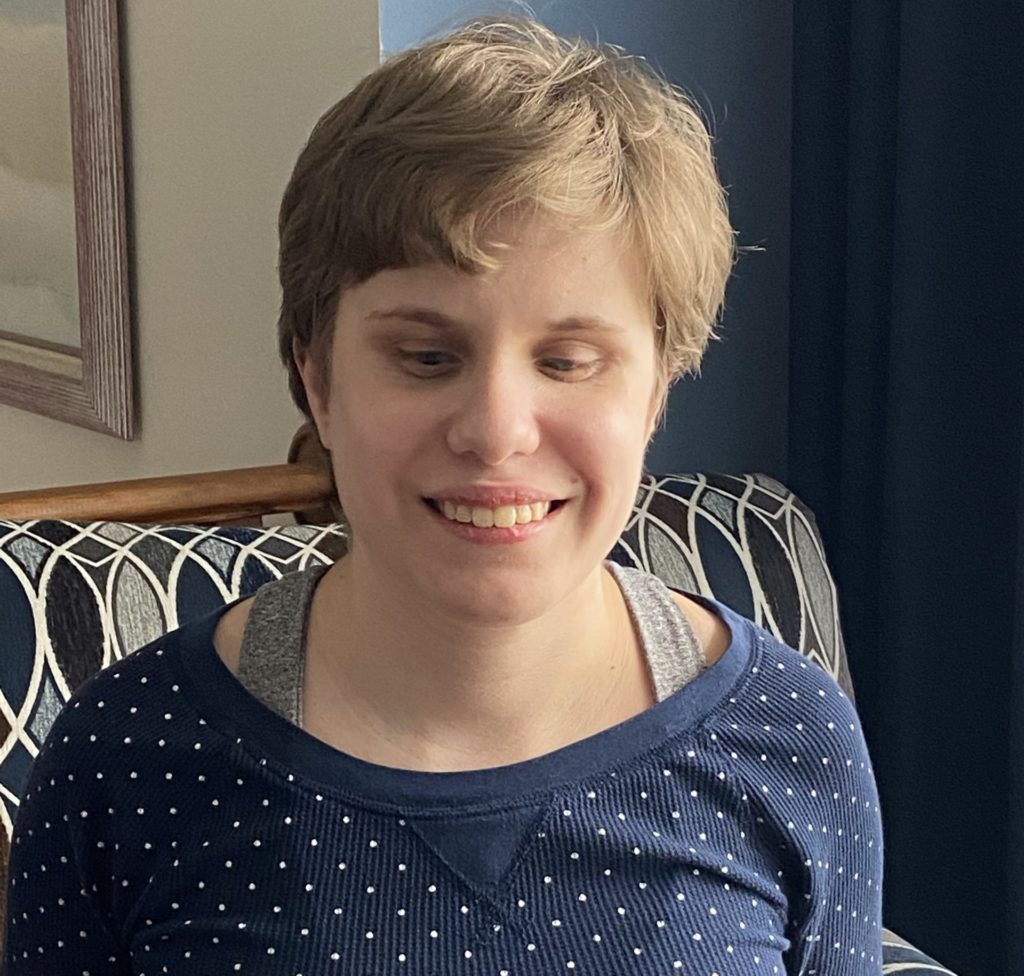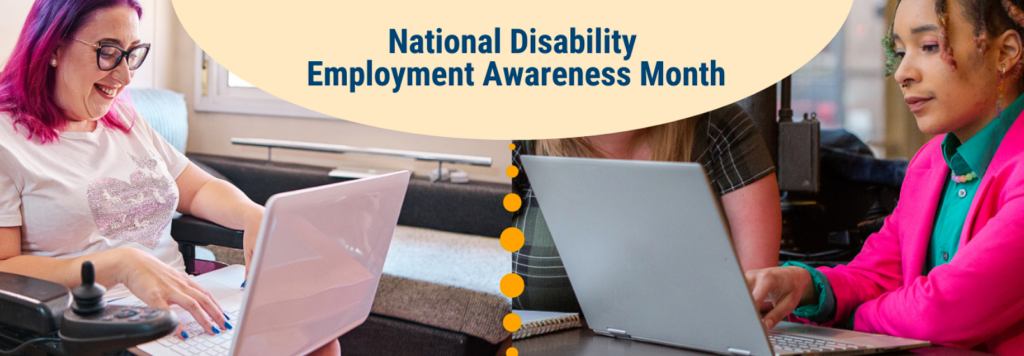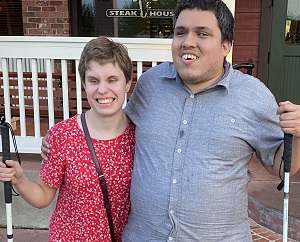Working While Blind: Job Hunting and Inaccessible Hiring Practices
by Alicia
by Alicia Krage
I graduated from Northern Illinois University in December 2019, getting a bachelor’s degree in human development and family sciences. I wasn’t quite sure what I wanted to do with it — my original plan was to go to graduate school and get my master’s to become a counselor, but I was already starting to get burnt out — but I was determined to figure it out. I loved my classes and was sure I could find something in my field, since it was broad enough that it would allow for many different opportunities. Even if my first job out of college didn’t align perfectly with my degree, I felt accomplished walking that stage and was ready to take on the world and tackle the job search.
A few weeks before the pandemic started, I got the opportunity to observe classes at the Chicago Lighthouse teaching Apple products to newly blind senior citizens. Though it didn’t line up with my college degree, I enjoyed it. As someone who’s been using VoiceOver on the iPhone for 10 years, I thought I’d be well qualified. So, after observing and even being able to help, I applied for a volunteer position which would give me the chance to test my skills before taking a paid position. And then we were quarantined.
 My life was at somewhat of a standstill for a while. Even when quarantine was lifted, there were still some restrictions. I felt like I didn’t really get the opportunity to explore much of post-graduation life or put myself out there to see what type of job I’d be looking for.
My life was at somewhat of a standstill for a while. Even when quarantine was lifted, there were still some restrictions. I felt like I didn’t really get the opportunity to explore much of post-graduation life or put myself out there to see what type of job I’d be looking for.
A while later, after not having much luck with the vocational rehabilitation services, I reached out to my university’s career services department to see what advice they had. They encouraged me to create a profile on Indeed and LinkedIn and search for jobs there, since it would allow for searches like “remote” and “work from home.” Ultimately, I opted for Indeed. My short experience with LinkedIn proved to be more frustrating than anything else. The inaccessibility of both the app and website made me more stressed than I already was looking for jobs.
While accessible, my experience with Indeed was not the greatest in terms of luck. I applied for countless jobs, but was always met with one of the following outcomes: I didn’t meet all the qualifications, never heard back, or would get halfway through the application process before coming across an inaccessible portion and not getting further assistance or accommodations for the parts that I could not complete. A lot of the jobs required some sort of assessment as part of the application process, asking a series of questions that would often consist of different customer-service-like scenarios and giving multiple choices of how you’d handle said scenario. Sounds easy enough, but neither JAWS nor VoiceOver would read some of the questions. Some questions would involve pictures and wouldn’t let me skip to the next question. So, I’d reach out to the employer via Indeed, explain that I’m blind and could not complete the assessment, and would ask for accommodations so I’d get a fair shot. That was usually when I wouldn’t hear back. Or I’d get the very common and frustrating response of ,”can you have a sighted person help you?”
I don’t like to disclose my blindness if I can help it. I’d like the employer to see me as a qualified candidate for the position rather than immediately seeing me for my blindness, writing me off before they really get a chance to know me. But in some situations such as these, it was unavoidable. And yes, I could’ve had someone help me, but to me, that wasn’t the point. Their site wasn’t accessible, and I shouldn’t have to rely on someone sighted in my household (or even a sighted friend) to assist me. A company should be willing to accommodate. And if they weren’t willing, would I want to work for them anyway?
I even came across a job application for a blindness organization that wasn’t accessible. Some job applications would say that a driver’s license was required. Some asked if you had a license or reliable transportation. I didn’t have a license, obviously, but I did have reliable transportation. I got rejected.
Needless to say, I was very discouraged and started to lose my motivation. For a while, I wondered if it was maybe because of COVID. My life had been at a standstill for so long that I was almost accustomed to not doing much. One rejection after another didn’t help my motivation, either.
In early 2021, while visiting my partner in Houston for two weeks, I suddenly found myself wanting to visit all these places. The Lighthouse, their independent living center, anything that would allow me to network. It was a great feeling — suddenly feeling motivated again and wanting to work — but another thing occurred to me: maybe I needed a change of scenery. Maybe I needed something different. Maybe I needed to live somewhere with better transportation, better jobs, and just step out of my comfort zone and see if I liked living somewhere else. It was the first time I considered moving. But I was scared because Chicago is all I’ve ever known. So, I kept my job search to Illinois and looked remotely in Houston, not quite sure where I wanted to reside or even what I wanted out of life. I was stuck between wanting to take any job because it was there, and being particular with my job search because I did want to enjoy my first job out of college. I didn’t want just any old job. I wanted to be happy.
In 2022, I stayed in Houston for a month. I wanted to explore more of the city, meet new people, and do some networking. I also wanted to make sure my partner and I could live under the same roof. We’d been long distance for 2 years by then and going from seeing each other 4 times a year to every single day was a huge step. I wanted to make sure we could both handle it. I did a lot of networking, toured the Lighthouse of Houston, explored their transportation for people with disabilities, and noticed a different sense of community. There also seemed to be this sort of familiarity with blindness, like a lot of sighted people around us were completely unphased. And I decided — I wanted to relocate. I didn’t know when, but I wanted to. And I wasn’t comfortable moving without a job.
I switched my job search location on Indeed to Houston, checking the box that said I’d relocate. When I wrote my cover letter, I mentioned that I’d even be willing to travel for the interview. Nothing seemed to work. All the jobs I was qualified for required residency, so I never heard back. It didn’t matter that I was willing to relocate or that I’d travel for the interview. What mattered was that I didn’t live there.
After a lot of conversing, my partner Juan suggested that maybe I move first and then look for a job. We both agreed that maybe it would be beneficial for me to take some time to get settled first anyway, rather than moving and immediately starting a job. For blind people, there’s a lot more that’s involved in moving, especially out of state, like signing up for the para-transit service and any vocational services you might need. Once that was all set up, I’d look for jobs. So that’s precisely what I did.
In March of 2023, I moved from my hometown and relocated to Houston. Four months later, I began volunteering at the Metropolitan MultiService Center. I worked at the front desk, answering calls and inquiries about the center and the services they provided. I then attended an Abilities Expo in August. Various companies were there, including Fable, a company that works with customers to make sure their products, websites, and apps are accessible and compatible with screen-reading software. They were doing on-sight interviews, so I did one, followed by an assessment a few weeks later via Zoom to test my assistive technology skills. And at the end of August, I was hired as an accessibility tester.
My job search has been a long road, but it feels good to finally find something I love and am passionate about. It’s different from the traditional 9-to-5 job, as it’s independent contract work, so there’s no set number of hours. The pay isn’t hourly, but it’s per meeting, but accessibility is something I’ve always been passionate about. Whenever I come across an inaccessible app or website, I would often think, “I wish they would actually have blind people test these to make sure they work.” And so here I am — I get to do just that.
I’ve been living here for six months now, and I’m much further along than I thought I would be. Stepping out of my comfort zone and attending the Expo really gave me such a wonderful opportunity. I learned a lot about doing what I love, even if it’s a little off course and not precisely what my degree says. And even if it’s not a traditional 9-to-5. There are a lot of nontraditional jobs out there, and I think that mindset could really help disabled people find work. If you expand your horizons beyond the societal expectations of what we should be doing, you could find a lot of great opportunities out there.
Alicia Krage is a graduate of Northern Illinois University. She relocated to Houston, Texas in early 2023 where she found a great community of people with disabilities. She has a passion for writing, centering her posts on advocacy, inclusivity, and relationships as a totally blind person.








